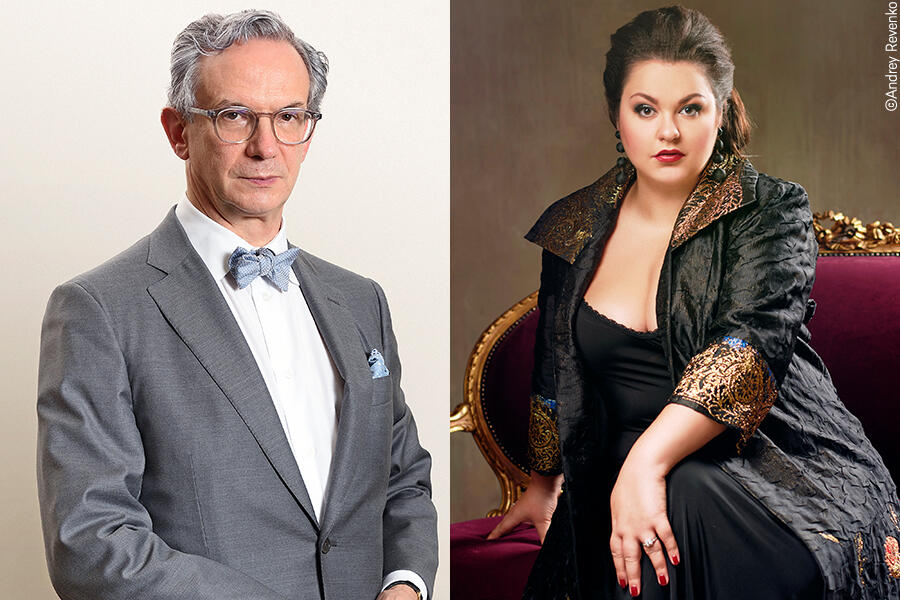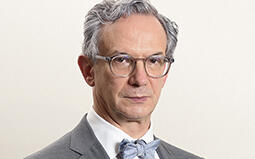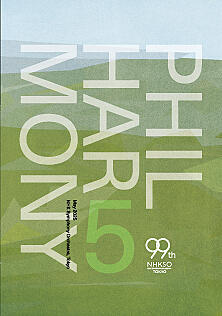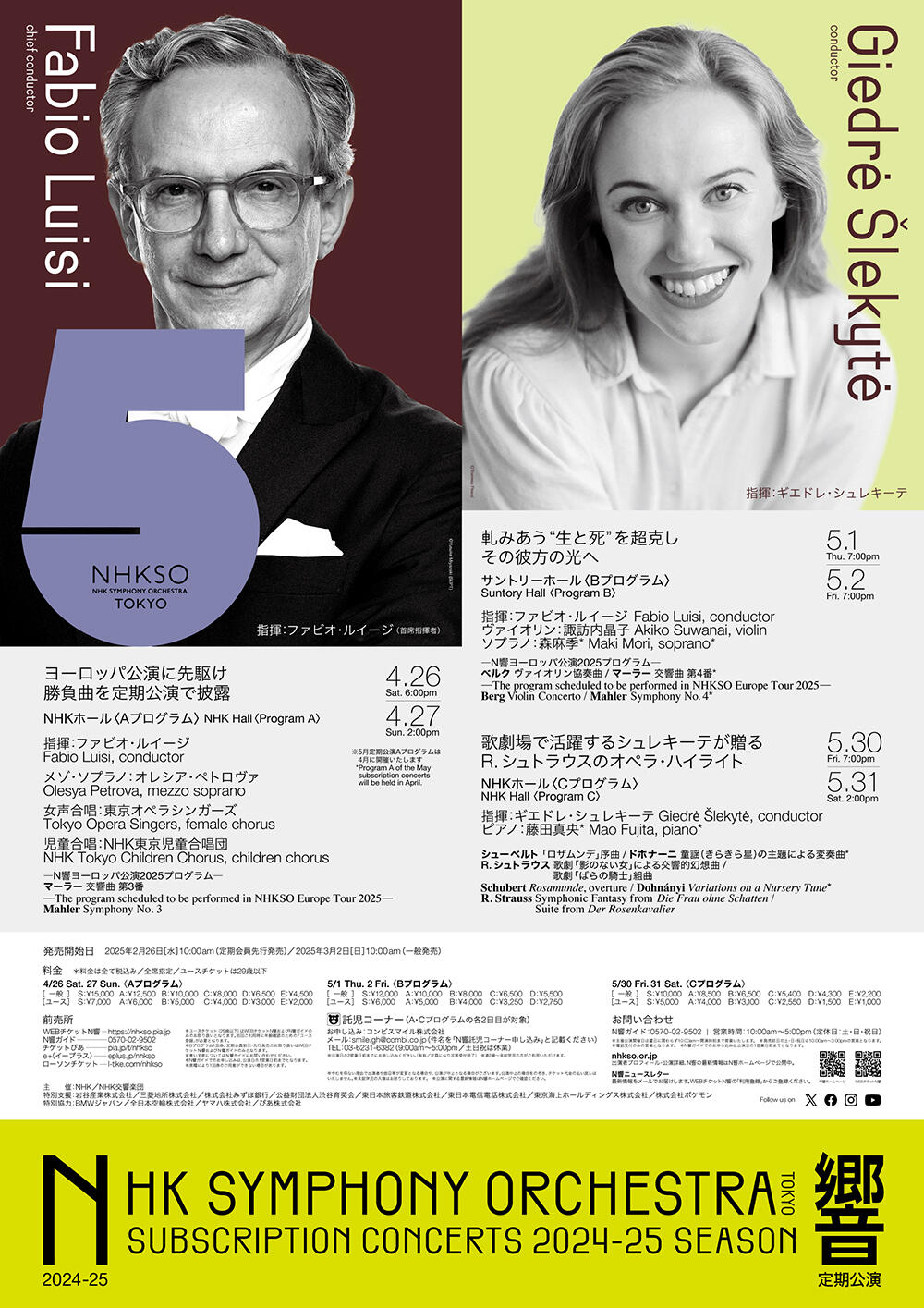- Home
- Concerts
- Subscription Concerts 2024-2025
- Program A
- No. 2036 Subscription (Program A)
No. 2036 Subscription (Program A)

Program
- The Program Scheduled to be Performed in NHKSO Europe Tour 2025 -
Mahler / Symphony No. 3 D Minor
The NHK Symphony Orchestra led by Fabio Luisi will soon be the first Asian orchestra to appear at the famed Mahler Festival held in Amsterdam’s Concertgebouw hall, performing the composer’s Symphonies No. 3 and No. 4 (on May 11th and 12th). The Netherlands’ capital that Mahler affectionately called “my second music homeland,” always welcomed his performances and works since he debuted there in 1903 conducting his No. 3 at the invitation of Willem Mengelberg, then the Concertgebouw Orchestra’s Principal Conductor.
Born into a Jewish family in Kalischt, Bohemia (in the Austrian Empire), Gustav Mahler (1860–1911) was reputed above all, a distinguished conductor during his lifetime. The future Director of the Vienna Court Opera (today the Vienna State Opera) and Principal Conductor of the New York Philharmonic, he was the Hamburg State Opera’s Chief Conductor when he wrote No. 3. The composition took place mostly in Steinbach, an area of spectacular natural beauty by the lake Attersee in Upper Austria, during the summers of 1895 and 1896. Back in 1893, the busy conductor had established his pattern to compose at a scenic resort during the off-concert-season as a “summer composer.”
Cast in six movements (planned in two parts), No. 3 calls for a large orchestra, an alto solo singer, a female chorus and a children chorus to depict all things in nature. Indeed, Mahler bore in mind some programs for the entire work and each movement. Although these programs were evolving and ultimately removed, they have helped both interpreters and listeners to be prepared for the composer’s longest symphony with the last three movements performed without break (the following titles were presumably handed to the audience at the 1902 premiere of the whole work in Krefeld, Germany).
“A Summer’s Morning Dream”
[Part 1] (I) The extended first movement “Pan Awakes, Summer Marches In (Bacchic Procession)” opens with a fanfare of eight horns in unison. This melody evoking the finale of Brahms’s Symphony No. 1, will be transformed into the principle theme of the sixth movement.
[Part 2] (II –VI) The second movement “What the Flowers in the Meadow Tell Me” is a minuet. The third movement “What the Animals in the Forest Tell Me,” a scherzo, begins with cuckoos and then nightingales twittering. The trio (central) section’s distant signals by a posthorn (of a mail coach) might suggest humans. The fourth movement “What Man Tells Me” has the alto solo sing Midnight Song (“Oh man! Take heed!” … “But all joy seeks deep, deep eternity!”) from Friedrich Nietzsche’s Thus Spoke Zarathustra. In the fifth movement “What the Angels Tell Me”, the children chorus imitates bells (“Bimm bamm”), while the alto solo and the female chorus sing about the three angels in heaven rejoicing that Peter is now free from sin thanks to the Lord Jesus. The sixth movement “What Love Tells Me” is a tranquil Adagio. This flexible rondo on the theme given by violins at the start will conclude grandly in D major.
[Kumiko Nishi]
Artists
 ConductorFabio Luisi
ConductorFabio Luisi
Fabio Luisi hails from Genoa. He is the Principal Conductor of the Danish National Symphony Orchestra and the Music Director of the Dallas Symphony Orchestra. He first conducted the NHK Symphony Orchestra in 2001, and in September 2022 he became Chief Conductor of the orchestra. He conducted Verdi’s Requiem in the concert to celebrate his appointment, and Mahler’s Symphonie der Tausend to commemorate the orchestra’s 2000th subscription concert in December 2023. These two monumental performances have brought him great success. He has presented works of German and Austrian composers such as Beethoven, Brahms, Bruckner and R. Strauss as well as those of Franck and Saint-Saëns, Francophone composers, and with his conducting style full of passion and poetic sentiment, has captured the hearts of many of audience members. In August 2024, he led the orchestra’s Taiwanese tour, and then will also lead a European tour in May 2025, which has been scheduled in conjunction with the Mahler Festival at The Concertgebouw, Amsterdam, the Prague Spring Festival and the Dresdner Musikfestspiele to which the NHK Symphony Orchestra has been invited.
He was General Music Director of the Opernhaus Zürich, Principal Conductor of the Metropolitan Opera in New York, Principal Conductor of the Wiener Symphoniker, as well as General Music Director of the Staatskapelle Dresden and the Sächsische Staatsoper, Artistic Director and Principal Conductor of the MDR Sinfonieorchester Leipzig, Music Director of the Orchestre de la Suisse Romande and Chief Conductor of the Tonkünstler Orchester. He is Music Director of the Festival della Valle d’Itria in Martina Franca (Apulia) and has appeared as guest conductor with numerous renowned ensembles, including the Philadelphia Orchestra, the Cleveland Orchestra, the Münchener Philharmoniker, the Filarmonica della Scala, the London Symphony Orchestra, the Royal Concertgebouw Orchestra, and the Saito Kinen Orchestra, while also conducting operas at world’s major opera houses. Important recordings include Verdi, Bellini, Schumann, Berlioz, Rachmaninov, Rimsky-Korsakov, Frank Martin, and Franz Schmidt, the largely forgotten Austrian composer. In addition, he has recorded various symphonic poems by Richard Strauss, and a lauded reading of Bruckner’s Symphony No. 9 with the Staatskapelle Dresden. His recordings of Wagner’s Siegfried and Götterdämmerung with the Metropolitan Opera won Grammy awards. In May 2025, Bruckner’s Symphony No. 8 (1st version), which is his first CD with the NHK Symphony Orchestra, will be released.
 Mezzo SopranoOlesya Petrova
Mezzo SopranoOlesya Petrova
Olesya Petrova is a Russian mezzo-soprano who sings in a powerful and intense voice. She was born in Leningrad, and graduated from the St. Petersburg State Conservatory. She won 2nd prize at the 13th Tchaikovsky International Competition (vocal, female section) in 2007, and the 1st prize at the 2nd Paris Opera Competition in 2012. From 2007 to 2016, she was engaged as a soloist of the St. Petersburg Conservatory Opera and Ballet Theatre, while making her debut at the Metropolitan Opera singing the role of Madelon in Andrea Chénier in 2014. Since 2016, as a soloist at the Mikhailovsky Theatre in St. Petersburg, she has sung the roles of Ulrica in Un ball in maschera, the Countess in The Queen of Spades, and Amneris in Aida. Until now, the opera houses she has appeared at include the Deutsche Oper Berlin, the Opernhaus Zürich, the Staatsoper Hamburg, and the Teatro Real in Madrid. She has been invited to the Arena di Verona Festival on a regular basis since 2017, made her debut at the Bolshoi Theatre in 2018 singing the role of Polina in The Queen of Spades, and at the Royal Opera House, Covent Garden in 2023, with the role of Amneris.
She is also actively appearing in concerts. With the NHK Symphony Orchestra under Fabio Luisi, she previously sang Verdi Requiem in September 2022, Mahler’s Sinfonie der Tausend in December 2023, and is expected to sing with the orchestra in its European tour in 2025. In her performance in the coming subscription concert, she will surely illustrate Mahler’s world with her nuanced, emotionally-rich singing.
[Junko Shibatsuji, music critic]
 Female ChorusTokyo Opera Singers
Female ChorusTokyo Opera Singers
Tokyo Opera Singers was formed in 1992 by mid-career and young vocalists active in Tokyo in response to the late Seiji Ozawa’s request to establish a world-class chorus group in this country. From the year of the foundation, the group has performed at the Saito Kinen Festival Matsumoto (Presently called Seiji Ozawa Matsumoto Festival), and since 2004, consistently appeared at the Spring Festival in Tokyo while working with visiting opera companies and orchestras, including the Wiener Philharmoniker (under Simon Rattle and Seiji Ozawa), the Chicago Symphony Orchestra (under Riccardo Muti), and the Bayerische Staatsoper (under Wolfgang Sawallisch). The group also enjoys high artistic evaluation overseas, and has appeared in the Edinburgh International Festival (1999), the China Shanghai International Arts Festival (2018), the Shanghai Symphony Orchestra Concert (2019), and “Meet in Beijing” International Arts Festival (2020).
Since its first collaboration with the NHK Symphony Orchestra in 2009 singing in the oratorio The Creation, it has worked with the orchestra in many occasions, including the orchestra’s year-end Beethoven 9th concerts and the Wagner series in the Spring Festival of Tokyo since its first year (2010). At the time of the orchestra’s concert of Faust Symphony conducted by Fabio Luisi in December 2024, Tokyo Opera Singers’ male chorus sung magnificently.
[Junko Shibatsuji, music critic]
 Children ChorusNHK Tokyo Children’s Chorus
Children ChorusNHK Tokyo Children’s Chorus
NHK Tokyo Children’s Chorus (formerly known as Tokyo Broadcasting Children’s Chorus Group), formed in March 1952 aiming to enrich NHK’s education and children’s programs for the healthy growth of the minds and spirits of children, performs with major Japanese orchestras and engages in exchange projects with overseas chorus groups in addition to its appearances in NHK’s broadcasts. The chorus also introduces works which it has commissioned Japanese composers to write to Japanese and overseas audiences. In 2022, it marked the 70th anniversary of its foundation.
The chorus has won many prizes in competitions at home and abroad, including 1st prize in the children’s category of the Centennial of Zoltán Kodály’s Birth Competition and the grand prix in the competition’s general category. In 2009, it worked with the NHK Symphony Orchestra in the concert to celebrate the 50th anniversary of the marriage of the Emperor and Empress, and the 20th anniversary of the Emperor’s enthronement. It also performs in operatic works staged at New National Theatre, and participated in Royal Opera’s Turandot on its Japan tour in 2024. NHK Tokyo Children’s Chorus appeared in the NHK Symphony Orchestra’s subscription concert for the first time in November 1971, singing in La damnation de Faust under Jean Fournet. And in recent years, it sang in Tchaikovsky’s ballet music The Nutcracker in December 2018, and in Mahler’s Symphonie der Tausend in December 2023 with the orchestra.
[Junko Shibatsuji, music critic]
Download
Ticket
Program A
No. 2036 Subscription (Program A)
NHK Hall
Google Map
Seating Chart
Single Tickets Release Date
Pre-sales for Subscribers:Wednesday, February 26, 2025
*about subscribers
Sale to General Public:Sunday, March 2, 2025
Price
| S | A | B | C | D | E | |
|---|---|---|---|---|---|---|
| Ordinary Ticket | 15,000 | 12,500 | 10,000 | 8,000 | 6,500 | 4,500 |
| Youth Ticket | 7,000 | 6,000 | 5,000 | 4,000 | 3,000 | 2,000 |
Seating chart Enlarge Print PDF
*tax included
*Subscribers receive a 10% discount (Available at NHKSO WEB Ticket and N-Kyo Guide)
*For wheelchair-accessible seats, please refer to the N-Kyo Guide
Youth Tickets
Youth Tickets are great options for those of 29 years old and younger
Subscription tickets
Release Date
ANNUAL SUBSCRIPTION TICKETS
Mon., July 15, 2024 10:00am
[For Subscribers: Sun., July 7, 2024 10:00am]
SEASONAL SUBSCRIPTION TICKETS (SPRING)
Wed., February 19, 2025 10:00am
[For Subscribers: Thu., February 13, 2025 10:00am]
Where to buy
NHKSO WEB Ticket | Saturday, April 26, 2025 (In English / Seats not selectable)
NHKSO WEB Ticket | Sunday, April 27, 2025 (In English / Seats not selectable)
NHKSO WEB Ticket (In Japanese only / Seats selectable)
N-Kyo Guide (Purchase by telephone only)
Other Ticket Agents
*Repertoire, conductor, soloists and program order are subject to change without notice.
*Pre-school children are not allowed in the concert hall



